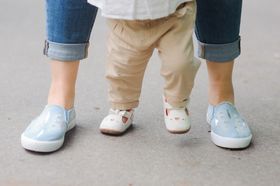The Importance of Play to your Child’s Holistic Development
Updated June 9, 2025

Children’s active play has significantly decreased over the last few years. Unlike before, when raucous, sweaty and energetic kids outside were common to see, today playtime is spent engaging in more sedate activities. The reduced physical activity derived from play is ultimately unhealthy for your child.
The change in behaviour is largely influenced by the emergence of digital entertainment. Instead of playing outdoors, getting tanned and scrapped knees, young children are spending more and more time indoors playing video games or watching TV. Given the option of spending time with other children their age, many kids prefer to interact online.
Importance of Active Play for your Child’s Development
Active play contributes to your child’s holistic wellness as well as it is fantastic way gather new knowledge. Here are the top benefits of play:
- Develop Social Skills – Active playtime with other kids gives your child the chance to interact and socialise with his or her peers. Through play, they learn a lot of social and interpersonal skills. By sharing toys, they learn the value of give and take. Waiting in line teaches them patience and equality. Winning in games tells them how to value perseverance and hard work while losing will give them a lesson on resilience and appreciation of others. Conflict and fights are unavoidable, but guiding your child how to resolve conflicts through peaceful and positive means will make him or her a strong and empathetic person.
- Develop Physical Skills – Active play is the perfect form of exercise for young children. Running, jumping, tumbling and climbing help develop muscle and bone health. Their exertion during play helps develop their stamina, motor skills, coordination and balance. It is no surprise that active children are healthier, sleep better, more alert and less prone to obesity, cardiovascular diseases and common illnesses.
- Develop Communicating Skills – Kids will talk and communicate more while in the playground than when indoors playing solitary games. Aside from verbal communication, playing also helps develop cognitive skills, understanding, and better recognition of the non-verbal language.
- Build Confidence – It is through play that we first develop lifelong friendship and relationships. Friends and playtime help build confidence, sense of belonging and community connection. Their games and activities give a sense of accomplishment and experience. Confident kids do better in school and in life.
- Develop their Creativity – Creative thinking is enhanced by play. Play acting is a good example of a play that encourages imagination and artistry. Competitive games help develop problem-solving skills, teamwork and tactical planning.
How to Encourage and Make Play Enjoyable for Kids
Many children will prefer to stay indoors or inside their room and play alone. Take it as your job as a parent to encourage your child to play. Also, note that active and group plays are not for everybody. Some kids have strong and valid reasons to defer from strenuous activities. If all encouragements are done and your child still shuns from it, look closer into his or her health and physical condition.
Limit Screen Time
Limit your kids’ TV or computer time to one or two hours a day, even less for younger children. For school kids, computer use should be limited to school work and no TV during weekdays. And no gadgets or TV should be inside your child’s bedroom.
Limit Electronic Toys
Do not splurge on electronic toys for your kids. One Wii for the entire family to use is enough. Encouraging them to play outside becomes a lot easier when your kids don’t have the gadgets. Instead of electronic toys, buy them old traditional toys like dolls, books, toy carts, kites, balls and Frisbees.
Schedule Playtime
Allow your kids about an hour a day of uninterrupted playtime. It could be indoor or outdoor play. Younger kids might need supervision, but try to keep an eye from afar. Let them explore the cupboards, build tents, run around, climb trees and monkey bars and just about anything they set their mind to do.
Encourage Outdoor Activities
If possible, provide a safe and interactive playground. Your backyard – fenced, child-proofed and secure is perfect. You can build sandboxes, set up a trampoline, or a treehouse. Just make sure you take all safety precautions. If you don’t have a backyard, take your kids to your nearest park or playground at least three time in a week.
Dress them accordingly
Kids should be comfortably dressed during play. Expect them to do a lot of running, tumbling, jumping and climbing. Send them out in light comfortable clothes and sturdy supportive shoes. If the air is a bit chilly, add a sweater or a jacket to keep them warm.
Remember that it is during play that your child’s feet are mostly put to strain. All the active physical actions are supported by their little feet. Kids under 12 years old are still developing their bones and muscles, which include the bones in their feet. The bones supporting the arch of his or her feet are still soft and developing and needs to be supported with the appropriate footwear.
First Walkers offers a wide collection of specifically designed children’s shoes that cater to growing kids. Click here to check out our delightful line of supportive shoes for kids from one-year-old pre-walkers to active school preteens.
KIDS HAVING FUN RUNNING!





